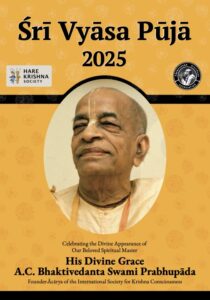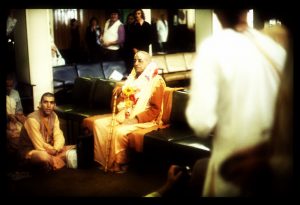Some questions for the New Dwarka assembly of devotees
- What about the actual meaning of the song…does it only apply to a particular type of devotee or spiritual master?
“This song is offering obeisances particularly to the spiritual master, and the symptoms of the spiritual master are described in this prayer. The spiritual master has two kind of symptoms in his activities. One kind is called constant, and other kind is called temporary. So the first verse says that the constant symptom of the spiritual master is that he can deliver his disciples from the blazing fire of this material existence. That is the eternal qualification of spiritual master. Trāṇāya means for deliverance, andkāruṇya means compassionate, very merciful. The spiritual master comes to the deliverance of the fallen souls out of his causeless mercy. Nobody has any business for the sufferings of others. The best example is Lord Jesus Christ, that he suffered for others. And it is the principle in the Bible that he accepted all the sins of others. This is the sign of spiritual master, that he voluntarily accepts the sinful activities of others and delivers them. That is the qualification of spiritual master. How it is? Just like ghanāghanatvam. Ghanāghanatvam means dense cloud in the sky. The first example has been said, that this material existence is just like forest blazing fire. Now, to extinguish the forest blazing fire, there is no use of sending fire brigade. The firebrigade cannot approach the forest fire; neither any man can go there to extinguish the fire. One has to depend completely on the mercy of nature. That means one has to completely depend on the cloud in the sky. Otherwise, there is no question of pouring water on that blazing fire. So the example is very appropriate. As man-made engine or fire brigade is unable to extinguish the forest blazing fire, similarly, the material existentional blazing fire cannot be extinguished by any man-made method.” Song Purports : Purport to Sri-Sri-Gurv-astakam — Los Angeles, January 2, 1969“So guru means spiritual master means who can deliver one from this forest fire. Just like when there is forest fire, the animals are very much disturbed, and they die mostly. The snakes, they die immediately. So this forest fire, saṁsāra-dāvānala,is going on perpetually, and the person or the authorized person who can deliver you from this forest fire of material existence, he’s called guru, or the spiritual master. Saṁsāra-dāvānala- līḍha-loka-trāṇāya kāruṇya-ghanāghanatvam. […] Just like cloud takes the water from the sea-cloud hasn’t got its own water; cloud takes water from the sea—similarly, a spiritual master brings mercy from the Supreme Personality of Godhead. Just see the comparison. He has no own mercy, but he carries the mercy of the Supreme Personality of Godhead. That is the qualification of spiritual master.” Lecture on Gurvastakam at Upsala University — Stockholm, September 9, 1973
- Spiritual master who can actually deliver his disciples
- Spiritual master who is directly receiving the mercy of Lord Krishna
- Spiritual master who is authorized
- Spiritual master in the same category of Lord Jesus Christ (a śaktyāveśa avatāra)
- If there should be no change from the standard that Srila Prabhupada set, why are there even other initiating gurus to begin with?
This is the real question which nobody wants to ask. It had always only been Srila Prabhupada as the initiating guru in ISKCON. Upon his disappearance this changed and many gurus sprouted and began initiating their own disciples, splitting the world into zones and having their disciples in those zones chant their own names in the temple instead of Srila Prabhupada’s name. New Dwarka leaders acknowledge this history and assure us that the GBC, however, “outlawed” this practice. So the GBC has a record of changing the standard that Srila Prabhupada set but for some reason all of them still rely on the conclusions of the same GBC instead of what Srila Prabhupada actually says.
“I am the Spiritual Master of this institution, and all the members of the Society, they’re supposed to be my disciples. They follow the rules and regulations which I ask them to follow, and they are initiated by me spiritually” (Srila Prabhupada Radio Interview, 12 March 1968, San Francisco)
Srila Prabhupada never said that his status as spiritual master of the institution depended on his physical presence, just as he never said that the morning prayers being dedicated to him depended on his physical presence. Srila Prabhupada simply set a certain standard and practice for the society to follow and that’s that. There should have never been any change to that standard. But while the devotees of New Dwarka take shelter of the principle of no change to support one aspect of the established standard in ISKCON (mangala-aratik), they reject the very same principle when applied to an even bigger established standard – initiations!
- If my guru can “bloop”, in which case I would have to take shelter of Srila Prabhupada, why can’t I / shouldn’t I just take shelter of Srila Prabhupada from the very beginning?
“One should take initiation from a bona fide spiritual master coming in the disciplic succession, who is authorized by his predecessor spiritual master. This is called diksa-vidhana.” (SB 4.8.54 Purport)
“A bona fide spiritual master is in the disciplic succession from time eternal, and he does not deviate at all from the instructions of the Supreme Lord…” (Bg 4.42 Purport)
“The guru must be situated on the topmost platform of devotional service. There are three classes of devotees, and the guru must be accepted from the topmost class.” (Cc Madhya-lila 24.330 Purport)
“One should not become a spiritual master unless he has attained the platform of uttama-adhikārī.” (Nectar of Instruction 5)
“There is no possibility that a first-class devotee will fall down, even though he may mix with nondevotees to preach.” (Cc Madhya-lila 22.71 Purport)
“…sometimes, if a spiritual master is not properly authorized, and only on his own initiative becomes a spiritual master, he may be carried away by an accumulation of wealth and large numbers of disciples. His is not a very high grade of devotional service.”(Nectar of Devotion 14)Compare these statements by Srila Prabhupada with the GBC resolution:



